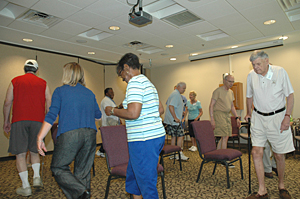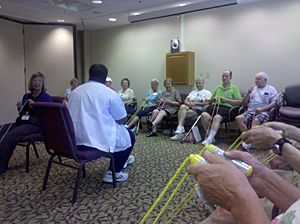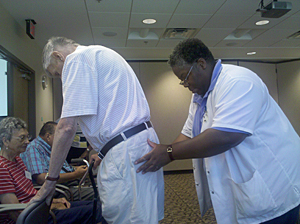
ADVERTISEMENT
- Rozovsky wins prestigious NSF Early Career Award
- UD students meet alumni, experience 'closing bell' at NYSE
- Newark Police seek assistance in identifying suspects in robbery
- Rivlin says bipartisan budget action, stronger budget rules key to reversing debt
- Stink bugs shouldn't pose problem until late summer
- Gao to honor Placido Domingo in Washington performance
- Adopt-A-Highway project keeps Lewes road clean
- WVUD's Radiothon fundraiser runs April 1-10
- W.D. Snodgrass Symposium to honor Pulitzer winner
- New guide helps cancer patients manage symptoms
- UD in the News, March 25, 2011
- For the Record, March 25, 2011
- Public opinion expert discusses world views of U.S. in Global Agenda series
- Congressional delegation, dean laud Center for Community Research and Service program
- Center for Political Communication sets symposium on politics, entertainment
- Students work to raise funds, awareness of domestic violence
- Equestrian team wins regional championship in Western riding
- Markell, Harker stress importance of agriculture to Delaware's economy
- Carol A. Ammon MBA Case Competition winners announced
- Prof presents blood-clotting studies at Gordon Research Conference
- Sexual Assault Awareness Month events, programs announced
- Stay connected with Sea Grant, CEOE e-newsletter
- A message to UD regarding the tragedy in Japan
- More News >>
- March 31-May 14: REP stages Neil Simon's 'The Good Doctor'
- April 2: Newark plans annual 'wine and dine'
- April 5: Expert perspective on U.S. health care
- April 5: Comedian Ace Guillen to visit Scrounge
- April 6, May 4: School of Nursing sponsors research lecture series
- April 6-May 4: Confucius Institute presents Chinese Film Series on Wednesdays
- April 6: IPCC's Pachauri to discuss sustainable development in DENIN Dialogue Series
- April 7: 'WVUDstock' radiothon concert announced
- April 8: English Language Institute presents 'Arts in Translation'
- April 9: Green and Healthy Living Expo planned at The Bob
- April 9: Center for Political Communication to host Onion editor
- April 10: Alumni Easter Egg-stravaganza planned
- April 11: CDS session to focus on visual assistive technologies
- April 12: T.J. Stiles to speak at UDLA annual dinner
- April 15, 16: Annual UD push lawnmower tune-up scheduled
- April 15, 16: Master Players series presents iMusic 4, China Magpie
- April 15, 16: Delaware Symphony, UD chorus to perform Mahler work
- April 18: Former NFL Coach Bill Cowher featured in UD Speaks
- April 21-24: Sesame Street Live brings Elmo and friends to The Bob
- April 30: Save the date for Ag Day 2011 at UD
- April 30: Symposium to consider 'Frontiers at the Chemistry-Biology Interface'
- April 30-May 1: Relay for Life set at Delaware Field House
- May 4: Delaware Membrane Protein Symposium announced
- May 5: Northwestern University's Leon Keer to deliver Kerr lecture
- May 7: Women's volleyball team to host second annual Spring Fling
- Through May 3: SPPA announces speakers for 10th annual lecture series
- Through May 4: Global Agenda sees U.S. through others' eyes; World Bank president to speak
- Through May 4: 'Research on Race, Ethnicity, Culture' topic of series
- Through May 9: Black American Studies announces lecture series
- Through May 11: 'Challenges in Jewish Culture' lecture series announced
- Through May 11: Area Studies research featured in speaker series
- Through June 5: 'Andy Warhol: Behind the Camera' on view in Old College Gallery
- Through July 15: 'Bodyscapes' on view at Mechanical Hall Gallery
- More What's Happening >>
- UD calendar >>
- Middle States evaluation team on campus April 5
- Phipps named HR Liaison of the Quarter
- Senior wins iPad for participating in assessment study
- April 19: Procurement Services schedules information sessions
- UD Bookstore announces spring break hours
- HealthyU Wellness Program encourages employees to 'Step into Spring'
- April 8-29: Faculty roundtable series considers student engagement
- GRE is changing; learn more at April 15 info session
- April 30: UD Evening with Blue Rocks set for employees
- Morris Library to be open 24/7 during final exams
- More Campus FYI >>
4:20 p.m., July 29, 2010----A large orange tub sits in the doorway of the conference room, overflowing with black plastic fly swatters, white plastic tubes, and jump ropes in every color on the spectrum from light purple to bright yellow.
The room gradually fills with people, some moving with the aid of walkers or canes, others unassisted. All are here for the first class in an exercise program developed specifically to meet their functional needs, and the gear in the tub has been carefully chosen to help realize that goal.
Half of the participants are stroke survivors, the other half are living with Parkinson's disease (PD), and all of them are enrolled in the class not only to improve their own physical capabilities but also to provide valuable data to a team of researchers and rehabilitation experts at the University of Delaware and Beebe Medical Center.
Led by Ingrid Pretzer-Aboff, assistant professor in UD's School of Nursing, the study is aimed at determining whether a community-based exercise program tailored to the needs of stroke survivors and individuals with PD can lead to improvements in activity and function across the spectrum of disability.
“Lack of activity is a major risk factor for morbidity and mortality,” Pretzer-Aboff said, “and we've found that fitness centers are generally not equipped to deal with persons with Parkinson's or stroke. If successful, our model will offer a cost-effective program for these individuals with unique needs.”
Marlene Kosnac, who is living with PD, knows that she needs to exercise but also knows that she doesn't like it. “I've benefitted from PT in the past,” she says, “but it lasts for only six or eight weeks, and once it's over, I find that I exercise less and less. I signed up for the class because I know this will make me do it.”
Researchers from both UD and Beebe developed the program, which is offered at the McCurry Conference Center on Beebe's Health Campus in Rehoboth Beach, Del. The UD team is leading the research components of the project, Beebe is implementing the exercise program, and both institutions will complete the evaluation procedures.
Study subjects include 15 people with stroke and 15 with PD. Separate exercise programs address the individual needs of these two neurologically disabling disorders, but both groups meet twice weekly for hour-long sessions that include a mix of walking, balance, arm, and speech activities. Participants were evaluated at Beebe before the training program and will be evaluated again at 12 weeks.
“You're helping us get information and helping yourselves get moving,” said Camilla Carter, physical therapist at Beebe, who led the stroke group on the first day of class. “We're going to be doing exercises for your body, your voice, and hopefully your mind.”
She held up a poster showing the class the Borg scale, which measures perceived exertion and helps instructors and coaches to assess training intensity. “It's important to know how much is enough and when you need rest,” she said. “Whatever you can do -- that's what it's about.”
She also insisted that participants not only move their bodies but also count out loud to the movements. “Voice and breathing are integral parts of what we're doing,” she said.
Carter was upbeat and encouraging but had little tolerance for excuses. She told participants that they should put both hands on the two-foot-long plastic tubes used for lifting, twisting, and rowing exercises. “I don't want to hear about one side being weak,” she said. “That's why we're here -- to make it stronger.”
If the pilot project is successful, the team plans to apply for additional funding to continue development, testing, and implementation of the exercise program on a larger scale. “Our long-term goal is to develop materials that will enable others to implement similar programs throughout the state and the Delmarva Peninsula,” Pretzer-Aboff said. “There is a tremendous need for resources like this in the region.”
Stroke survivor Nancy Shobe signed up for the class in an effort to improve her stamina. “It will be interesting to see what they can do for me,” said Shobe, who walks unassisted but is plagued by swelling in one leg that discourages her from exercising.
At the end of the hour, she walked out of the room smiling. “This was great,” she said. “I loved it.”
Kathleen Matt, dean of the UD College of Health Sciences, hopes to cultivate more collaborative projects between the University and health-care providers in the community. “Partnerships like this provide a platform for university-driven, patient-oriented research, an academic learning opportunity for our students, and an important service for the community,” she said.
In addition to Pretzer-Aboff and Carter, the core team on the study includes:
- Greg Hicks, assistant professor of physical therapy (UD);
- Michele Poynton-Marsh, speech-language pathologist (Beebe);
- Darcy Reisman, assistant professor of physical therapy (UD);
- Holly Sullivan, speech-language pathologist (Beebe); and
- Alice Workman, occupational therapist (Beebe).
Additional members include Cathy Ciolek, assistant professor of physical therapy; Christopher Knight, associate professor of kinesiology and applied physiology; Kelly Danks, research physical therapist; Joseph Mills, graduate nurse; Allyson Hayes, senior baccalaureate nursing student; Kendall Prowse, sophomore exercise science student; and Teri Raad, research assistant.
Article by Diane Kukich





